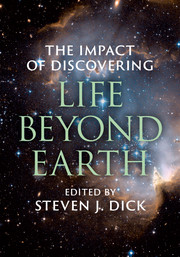Book contents
- Frontmatter
- Dedication
- Contents
- List of contributors
- Introduction: Astrobiology and society
- Part I Motivations and approaches: How do we frame the problems of discovery and impact?
- Part II Transcending anthropocentrism: How do we move beyond our own preconceptions of life, intelligence, and culture?
- 5 The landscape of life
- 6 The landscape of intelligence
- 7 Universal biology: assessing universality from a single example
- 8 Equating culture, civilization, and moral development in imagining extraterrestrial intelligence: anthropocentric assumptions?
- 9 Communicating with the other: Infinity, geometry, and universal math and science
- Part III Philosophical, theological, and moral impact: How do we comprehend the cultural challenges raised by discovery?
- Part IV Practical considerations: how should society prepare for discovery – and non-discovery?
- Contributor biographies
- Index
- References
8 - Equating culture, civilization, and moral development in imagining extraterrestrial intelligence: anthropocentric assumptions?
from Part II - Transcending anthropocentrism: How do we move beyond our own preconceptions of life, intelligence, and culture?
Published online by Cambridge University Press: 05 November 2015
- Frontmatter
- Dedication
- Contents
- List of contributors
- Introduction: Astrobiology and society
- Part I Motivations and approaches: How do we frame the problems of discovery and impact?
- Part II Transcending anthropocentrism: How do we move beyond our own preconceptions of life, intelligence, and culture?
- 5 The landscape of life
- 6 The landscape of intelligence
- 7 Universal biology: assessing universality from a single example
- 8 Equating culture, civilization, and moral development in imagining extraterrestrial intelligence: anthropocentric assumptions?
- 9 Communicating with the other: Infinity, geometry, and universal math and science
- Part III Philosophical, theological, and moral impact: How do we comprehend the cultural challenges raised by discovery?
- Part IV Practical considerations: how should society prepare for discovery – and non-discovery?
- Contributor biographies
- Index
- References
Summary
We shall not cease from exploration. And the end of all our exploring will be to arrive where we started and know the place for the first time.
– T. S. EliotWhen scientists, philosophers, theologians, and others think about extraterrestrial life, a fundamental roadblock is that the nature of such life is a matter of human imagination. Lack of data beyond Earth limits our capacity to think about extraterrestrial life, even if that capacity is being increasingly stretched by the discovery and study of extremophiles on our planet and exoplanets around other stars. Despite our growing ability to imagine previously unimaginable forms of life, when we think about extraterrestrial life, intelligent or otherwise, Earth remains our only example. And when it comes to thinking about extraterrestrial intelligence, this presents several very significant limitations, since it is quite difficult to imagine what we might share with beings that evolved on a world different from our own (DeVito 2014, 2).
First, the Earth-bound nature of the data on life we have predisposes us to think about extraterrestrial intelligence in human terms. When we talk about alien beings, cultures, or civilizations, it is difficult to move beyond what we know – imagination does not happen in a vacuum; it is based upon our observations of the world around us and the only observations of life, intelligence, and civilization we have are right here on Earth. Second, when we do attempt to think about extraterrestrial intelligence, there is a tendency to ignore the fact that we are building our ideas on comparison with our own world, and often that comparative structure is not grounded in a nuanced and complex understanding of our world and the history and nature of culture and civilization on Earth. Indeed, ideas like culture and civilization need to be problematized when we think about our own world, which makes this doubly important when thinking about what intelligent life might be like on other worlds.
There are two questions I want to explore in this chapter. First, I am interested in how notions of progress and development shape the imaginations of scientists and others when thinking about extraterrestrial intelligence (ETI), particularly when we are contemplating the moral nature of that intelligence.
- Type
- Chapter
- Information
- The Impact of Discovering Life beyond Earth , pp. 127 - 142Publisher: Cambridge University PressPrint publication year: 2015
References
- 3
- Cited by

